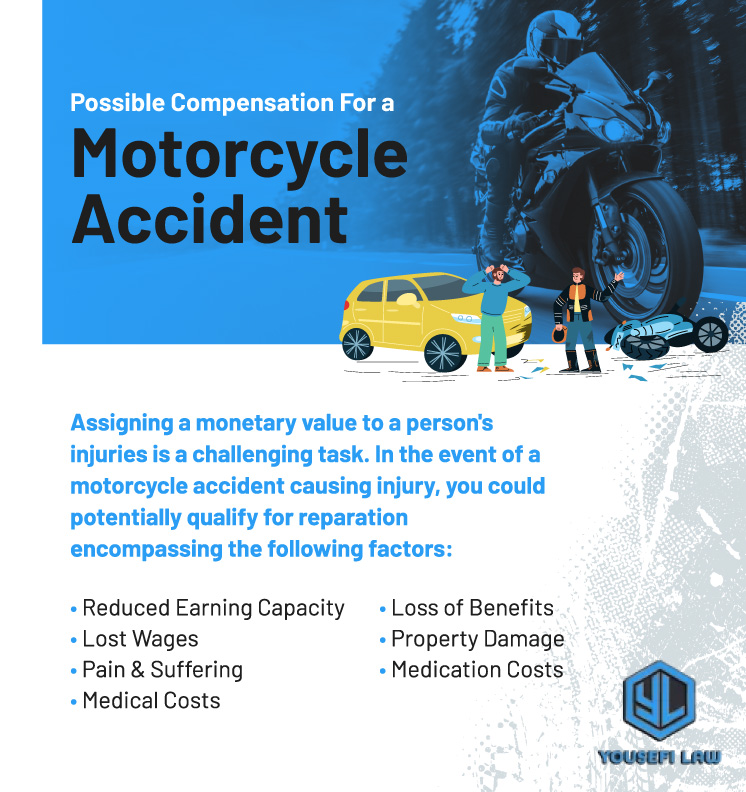
Riding a motorcycle can be exhilarating, but it also comes with increased risks, making it important to consult a Sacramento motorcycle accident attorney if needed. Most people recognize that motorcycles can be dangerous. According to the National Highway Transportation Safety Administration (NHTSA), in 2020, motorcyclists were about 28 times more likely than passenger vehicle occupants to die in a motor vehicle crash. And they were four times more likely to be injured. A recent Centers for Disease Control and Prevention report shows that most crash injuries and deaths are preventable. Nevertheless, motorcycle accidents happen. When they do, they can be incredibly tragic and also costly.
You may be eligible for compensation if you sustain an injury in a motorcycle accident. If you are looking for a Sacramento motorcycle accident attorney, the Law Offices of Ali Yousefi can help. Our legal team will explain all legal options, handle the case on your behalf, and aggressively fight for your legal rights. It is our goal to achieve the best possible outcome for your situation. Please call or contact us online today for a FREE case consultation.
What Is a Motorcycle Accident Lawyer?
A motorcycle accident lawyer is trained to handle complex motorcycle accident cases. The primary responsibility of an accident attorney is to help injured riders get the compensation they deserve. The best motorcycle accident lawyer is one who also understands your love for motorcycles and the risk you face while you ride.
Calling an attorney before calling your insurance company is wise. Your insurance company seeks to maximize profits for shareholders. Contacting a lawyer for injury advice puts your best interests first. Although no attorney can guarantee more money, a good motorcycle accident lawyer will fight hard for you at the negotiation table or in the courtroom.
Our law firm has experience helping injured victims seek financial recovery for losses such as:
- Past and future medical treatment,
- Disability,
- Disfigurement,
- Post-traumatic stress disorder,
- Lost wages,
- Loss of earning capacity,
- Property damage,
- Loss of enjoyment of life, and
- Pain and suffering.
This is not a definitive list of damages. A motorcycle accident lawyer can help prepare a comprehensive list of losses. This list will help your attorney calculate the compensation that you’re owed. Being represented by an attorney can be the difference between getting a lowball settlement offer and the compensation you deserve.
What Does a Motorcycle Accident Attorney Do?
They will be advantageous and help support the best outcome in your case. The facts and circumstances determine who is liable. A lawyer who is experienced in motorcycle accident claims is especially valuable and can help in the following ways:
Explaining Your Rights
An attorney can explain your rights as a motorcycle accident victim, ensuring you understand the legal protections and options available to you. They will guide you through the complex legal process, providing clarity on the steps involved and the potential outcomes of your case. They will also explain the different types of compensation you may be entitled to, such as medical expenses, lost wages, pain and suffering, and property damage. Lastly, they will help you understand the strengths and weaknesses of your case, enabling you to make informed decisions regarding settlement negotiations or pursuing a lawsuit.
Building Your Case
Drivers of other vehicles are responsible for recognizing the safety challenges motorcyclists face. Before you are entitled to any compensation, you must prove the other driver’s negligence. A successful negligence claim will depend on evidence showing that:
- The motorcycle accident occurred and caused your injuries;
- The at-fault party’s negligence led to the accident; and
- You suffered damages as a result of the motorcycle accident.
A motorcycle accident attorney will help you build your case. To support your case, your attorney will investigate who is responsible for the motorcycle accident. It is possible that more than one party can be liable for a motorcycle accident. This investigation can involve reviewing the police report, hiring experts for accident reconstruction, interviewing witnesses, and examining medical records. Your attorney will hire any experts required to prove your case.
Negotiating a Favorable Settlement
A motorcycle accident attorney will negotiate with insurance companies. Knowing how to deal with the insurance company is your attorney’s job. It is not uncommon for the insurance company to respond with an offer. However, this initial offer is usually a lowball amount that doesn’t cover your damages. The insurer may even try to make it seem like a good deal, but you can confidently push back with a lawyer on your side. When you hire legal counsel, you won’t fall victim to any insurance company’s tactics.
Representing You in Court
Although most motorcycle accident claims settle out of court, a settlement negotiation sometimes fails to resolve the case. Hiring an attorney equipped to take your case to court is critical to winning the maximum compensation.
Why Do I Need a Motorcycle Accident Attorney Near Me?
No one expects an accident or an injury—that is the nature of an accident. It’s probably not the best time to dig into complicated legal processes while dealing with injuries. While you focus on your recovery, let us handle all aspects of your case. When retaining our services, you can also expect us to safeguard your rights, handle all legal complexities, and shield you from potential pitfalls.

Common Causes of Motorcycle Accidents
Motorcycle accidents can occur due to various reasons, and understanding these factors is crucial for promoting road safety. Here are some key points detailing why motorcycle accidents happen:
- Lack of visibility: Motorcycles are smaller and less visible than other vehicles, making them more prone to accidents caused by a lack of visibility. Other drivers may fail to see motorcycles, especially in blind spots or during lane changes.
- Driver negligence: Many motorcycle accidents occur due to the negligence of drivers, both motorcyclists and other vehicle drivers. Speeding, distracted driving, reckless maneuvers, and failure to follow traffic rules contribute to the risk of accidents.
- Lane splitting: In some jurisdictions, motorcyclists engage in lane splitting, which refers to riding between lanes of slow-moving or stopped traffic. This practice can be dangerous if not done cautiously, as it increases the risk of side-swiping or being hit by other vehicles.
- Hazardous road conditions: Poor road conditions such as potholes, uneven surfaces, gravel, or oil spills can lead to loss of control for motorcyclists, resulting in accidents. Additionally, inclement weather like rain, snow, or ice can reduce traction and increase the risk of crashes.
- Inexperienced riders: Lack of experience and inadequate motorcycle training can contribute to accidents. Novice riders may be less skilled at maneuvering their motorcycles, reacting to sudden situations, or maintaining balance, increasing the likelihood of accidents.
- Impaired driving: Operating a motorcycle while under the influence of alcohol, drugs, or certain medications significantly impairs judgment, coordination, and reaction time, making it dangerous and increasing the chances of accidents.
- Mechanical failures: Defective motorcycle parts or lack of proper maintenance can lead to mechanical failures, such as brake failures or tire blowouts, resulting in accidents.
- Intersection collisions: Intersections are common sites for motorcycle accidents, often due to a failure to yield, running red lights, or making left turns in front of oncoming motorcycles.
- Lack of protective gear: Not wearing appropriate protective gear, such as helmets, jackets, gloves, and boots, increases the severity of injuries in the event of an accident.
Common Types of Motorcycle Injuries
Motorcycle accidents can result in a wide range of injuries due to the lack of protective barriers between the rider and the road or other vehicles. Some of the common types of motorcycle injuries include:
- Road Rash: When a motorcyclist slides across the road surface during an accident, it can cause abrasions, lacerations, and contusions, commonly referred to as road rash.
- Fractures and Broken Bones: The impact of a collision can lead to fractures and broken bones, often affecting the limbs, collarbone, ribs, or pelvis.
- Head Injuries: Traumatic brain injuries (TBI) are a significant concern for motorcyclists, even if they are wearing helmets. These injuries can range from concussions to more severe brain trauma.
- Spinal Cord Injuries: Motorcycle accidents can cause damage to the spinal cord, potentially leading to partial or complete paralysis, depending on the location and severity of the injury.
- Internal Injuries: The force of impact can cause damage to internal organs such as the liver, spleen, kidneys, or lungs, leading to internal bleeding and other complications.
- Joint and Soft Tissue Injuries: Ligament sprains, muscle strains, and other soft tissue injuries are common in motorcycle accidents, particularly in areas like shoulders, knees, and ankles.
- Burns: Motorcycle accidents may result in burns, especially if the motorcycle catches fire after the collision.
- Amputations: In severe accidents, the impact or entanglement with other vehicles or objects can lead to limb amputations.
- Facial Injuries: Motorcyclists are at risk of facial injuries, including fractures, disfigurement, and dental damage.
- Psychological Trauma: Beyond physical injuries, motorcycle accidents can also cause significant emotional distress and psychological trauma, such as post-traumatic stress disorder (PTSD).
- Whiplash: Sudden acceleration or deceleration during a collision can cause whiplash, leading to neck and upper back injuries.
- Crush Injuries: In situations where the motorcycle falls on the rider or the rider is pinned between objects, crush injuries can occur, potentially resulting in severe tissue damage.
It’s important to remember that even seemingly minor motorcycle accidents can lead to injuries that may not manifest immediately but could develop into more serious conditions over time. If you or someone you know is involved in a motorcycle accident, seeking immediate medical attention and a Sacramento motorcycle accident attorney is crucial to assess and address any potential injuries and claims.
Where Do Most Motorcycle Accidents Occur?
Most motorcycle accidents tend to occur in areas with high traffic density, where there is a mix of vehicles and diverse road conditions. Intersections are particularly dangerous for motorcyclists due to the potential for other drivers failing to notice them or misjudging their speed. Additionally, rural roads and highways pose risks, often involving higher speeds and limited visibility, leaving riders vulnerable to sudden hazards like wildlife or unexpected road debris. Parking lots and driveways are also hotspots for accidents, as motorcyclists may face challenges maneuvering around cars or encountering inattentive drivers. Awareness of these accident-prone locations can help motorcyclists exercise extra caution and vigilance while riding.
Steps to Take Following a Motorcycle Accident
Following a motorcycle accident, it is crucial to take immediate steps to ensure personal safety, seek appropriate medical attention, and gather important information. Here are the steps to take immediately after a motorcycle accident:
- Ensure personal safety: Move to a safe location away from traffic if possible, to avoid further harm or collisions. Turn on hazard lights and use flares or warning triangles to alert other drivers to the accident scene.
- Assess injuries: Check yourself and others involved in the accident for injuries. If anyone is seriously injured or in distress, call emergency services immediately.
- Call the authorities: Dial the emergency services or local police to report the accident, even if the injuries appear to be minor. Provide accurate details about the location, the number of vehicles involved, and any apparent injuries.
- Exchange information: Exchange contact and insurance information with the other parties involved in the accident. Obtain their names, phone numbers, addresses, driver’s license numbers, license plate numbers, and insurance details. If there are witnesses, collect their contact information as well.
- Document the scene: Take pictures or videos of the accident scene, including vehicle positions, damage, skid marks, and road conditions. This documentation can be helpful for insurance claims and legal proceedings.
- Seek medical attention: Even if you feel fine, it’s crucial to get a medical evaluation after a motorcycle accident. Some injuries, such as internal trauma or whiplash, may not be immediately apparent. Adrenaline can also mask pain or discomfort.
- Preserve evidence: Preserve any physical evidence related to the accident, such as damaged motorcycle parts or torn clothing. Additionally, keep records of medical treatments, expenses, and any other relevant documents.
- Consult with an attorney: If the accident resulted in significant injuries, property damage, or legal complications, it is advisable to consult with a personal injury attorney who specializes in motorcycle accidents. They can provide guidance on navigating the legal process and protecting your rights.
Remember, each accident is unique, and these steps serve as general guidelines. It’s important to prioritize personal safety and make decisions based on the specific circumstances of the accident.
Motorcycle Helmet Laws in California
In California, it is mandatory for all motorcycle riders and passengers to wear helmets that meet the standards set by the Department of Transportation (DOT). This applies to riders of all ages. The helmet must have a DOT-approved sticker or label on the back to indicate compliance with safety standards. It is important to ensure that the helmet you wear is certified and meets the required standards for optimal protection.
California law also requires motorcycle riders to wear some form of eye protection, such as goggles or a face shield, unless their motorcycle is equipped with a windshield that provides adequate protection.
Those who choose to not wear a helmet may face consequences if pulled over by authorities. Law enforcement officers have the discretion to decide whether or not to issue a citation and the corresponding fine amount as per the law. While some officers may opt for warnings or impose lower fines, they possess the authority to issue tickets that could amount to a maximum of $250. If you have been found speeding, driving under the influence, carrying a minor passenger without a helmet, or violating any other traffic laws, anticipate a higher fine. In severe instances, law enforcement may even opt to tow your motorcycle.
5 Essential Tips to Staying Safe on the Road as a Motorcyclist in CA
Riding a motorcycle can be an exhilarating experience, but it can also come with risks that may lead to severe injuries. Here is a list of five recommendations we feel every rider must adhere to if they want to be safe on CA highways:
- Wear Protective Gear: Always wear appropriate protective gear, including a DOT-approved helmet, sturdy jacket, long pants, gloves, and boots. This gear provides essential protection in the event of a crash and reduces the risk of serious injuries.
- Defensive Riding: Practice defensive riding techniques by remaining alert and anticipating potential hazards. Be mindful of blind spots, maintain a safe following distance, and consistently scan the road for potential dangers. Avoid aggressive maneuvers and assume that other drivers may not see you.
- Obey Traffic Laws: Adhere to all traffic laws and regulations, including speed limits, lane markings, and traffic signals. Avoid reckless behaviors such as lane splitting, excessive speeding, or weaving in and out of traffic. Following the rules of the road enhances your visibility and reduces the likelihood of accidents.
- Enhance Visibility: Make yourself more visible to other motorists by wearing bright and reflective clothing. Use your motorcycle’s headlights, even during the day, to increase your visibility. Position yourself in the lane where you are most visible to other drivers and use turn signals to indicate your intentions.
- Continuous Skill Development: Invest in ongoing rider training and education to improve your riding skills. Participate in advanced rider courses that focus on defensive riding, maneuvering techniques, and emergency braking. Increasing your skills and knowledge can significantly enhance your safety on the road.
Remember, safety should always be a top priority when riding a motorcycle. By implementing these practices, you can significantly reduce the risk of accidents and enjoy a safer riding experience.
Factors That May Affect the Value of a Motorcycle Injury Claim
The value of a motorcycle injury claim can be influenced by various factors, some of which include:
- Severity of Injuries: The extent of the injuries sustained by the motorcyclist is a significant factor. Severe injuries that result in long-term disabilities or require extensive medical treatment tend to result in higher compensation.
- Medical Expenses: The total medical expenses incurred as a result of the accident play a crucial role in determining the value of the claim. This includes hospital bills, surgery costs, medication expenses, rehabilitation, and ongoing treatment costs.
- Lost Wages and Income: If the accident causes the motorcyclist to miss work, leading to lost wages and income, the value of the claim may increase to compensate for the financial impact.
- Pain and Suffering: Non-economic damages, such as physical pain, emotional distress, and mental suffering, are also considered when evaluating the claim’s value. Calculating these damages can be subjective and may vary depending on the jurisdiction.
- Property Damage: If the motorcycle was damaged in the accident, the cost of repairs or replacement can be factored into the claim value.
- Liability and Fault: Determining who was at fault in the accident is critical. In some jurisdictions, if the motorcyclist is partially responsible for the accident, the compensation may be reduced proportionally.
- Insurance Coverage: The type and amount of insurance coverage held by both parties involved in the accident can influence the claim’s value. If the at-fault party has limited insurance or is uninsured, it may affect the potential compensation.
- Evidence and Witnesses: The strength of the evidence and the availability of witnesses can impact the claim’s value. Strong evidence, such as police reports, eyewitness testimonies, and video footage, can bolster the case.
- Pre-existing Conditions: The existence of pre-existing injuries or medical conditions can complicate the assessment of damages, as it may be challenging to determine the extent to which the accident aggravated the pre-existing condition.
- Legal Representation: The choice of legal representation and the expertise of the motorcycle accident attorney can influence the outcome of the claim. A skilled attorney can effectively negotiate and advocate for a fair settlement.
- Statute of Limitations: The time limit within which a claim must be filed varies by jurisdiction. Failing to file within this timeframe may prevent the injured party from seeking compensation.
It’s essential to note that each case is unique, and the specific circumstances surrounding the accident will heavily influence the claim’s value. Consulting with our personal injury attorney can help you understand the potential value of your claim more accurately.

Economic & Punitive Damages
In California, economic and punitive damages are types of compensatory damages that can be awarded in personal injury cases, including motorcycle accident injury claims.
- Economic Damages: Economic damages are the financial losses incurred by the injured party as a direct result of the accident. They are quantifiable and typically include:
- Medical Expenses: This includes all medical bills related to the treatment and rehabilitation of the injuries sustained in the motorcycle accident.
- Lost Wages: Economic damages can compensate for the income lost due to the inability to work during the recovery period.
- Property Damage: The cost of repairing or replacing the damaged motorcycle and any other personal property may be included.
- Future Expenses: If the injuries result in long-term or permanent disability, economic damages may cover ongoing medical care, rehabilitation, and future lost income.
- Punitive Damages: Unlike economic damages, which aim to compensate the injured party for their losses, punitive damages are not awarded in every case. Instead, they are intended to punish the at-fault party for particularly egregious or malicious behavior and to deter similar conduct in the future. Punitive damages go beyond compensation and are awarded on top of economic and non-economic damages (such as pain and suffering) as a way to punish the wrongdoer.
In motorcycle accident injury claims, economic damages are typically straightforward to calculate, as they involve tangible financial losses directly related to the accident. On the other hand, the availability of punitive damages in a motorcycle accident case depends on the specific circumstances surrounding the accident. For punitive damages to be awarded, there must be evidence of gross negligence, willful misconduct, or a wanton disregard for the safety of others on the part of the at-fault party.
It’s important to note that the laws regarding damages in personal injury cases can be complex, and they may vary from state to state. In California, consulting with an experienced personal injury attorney who specializes in motorcycle accidents can help injured parties understand their rights and pursue fair compensation for their injuries and losses.
How Long Will Your Motorcycle Accident Injury Claim Take to Settle?
The time it takes for a motorcycle accident injury claim to settle in California varies based on factors such as the severity of injuries, evidence gathering, insurance negotiations, legal complexity, and court schedules. It could range from a few months to several years. Working with a personal injury attorney experienced in motorcycle accidents can expedite the process, but each case is unique, and the timeframe depends on specific circumstances and legal complexities involved. Meeting the statute of limitations is crucial, and injured parties should act promptly to pursue fair compensation.
Contact an Experienced Sacramento Motorcycle Accident Attorney Today
Every motorcycle accident is unique. You can trust that the Law Offices of Ali Yousefi will give you the individualized attention your case deserves. We can help you navigate the legal process so that you can focus on the work of recovery. Ali Yousefi will evaluate your case, discuss its strengths and weaknesses, and develop a winning strategy. We seek to help alleviate the financial stress you face following an accident caused by someone else’s negligence. Put our experience handling personal injury cases to work for you. While we can’t erase the injuries, our Sacramento motorcycle accident attorney can fight for the compensation you deserve. After you have sought immediate medical attention following an accident, reach out to our law firm as soon as possible.
Contact us today for a free consultation and see how we can help.

